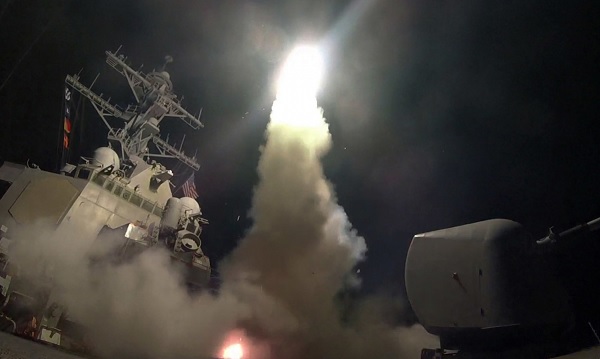By Alex Emmons, September 13, 2017, The Intercept.

After President Donald Trump launched a cruise missile strike against Syria in April, his administration struggled to justify the legal basis for the attack. For months, a watchdog group has hounded the Trump administration for its legal reasoning. Under court order, the government has finally produced documents that reveal little, if anything.
One document the administration saw fit to release is simply an aggregation of praise for Trump’s strike from pundits, lawmakers, and world leaders. It was prepared by Trump’s National Security Council.
On April 6, the United States fired 59 tomahawk missiles at Syria’s Shayrat air base in response to the regime’s use of chemical weapons in Khan Shaykhun, Syria, two days earlier.
The day after the missile strike, an advocacy group called the Protect Democracy Project filed a request with multiple agencies for documents that outline the administration’s legal basis for the attack. After the Pentagon and State Department denied the group’s request for expedited processing, a judge ruled in July that there was a “compelling need” for the information to get out and ordered the administration to provide answers “as soon as practicable.”
In response, the administration on Friday released nearly 60 pages of responsive documents, none of which contain any legal reasoning beyond what appears in the White House’s public statements. The Protect Democracy Project has published the documents on its website.
The documents consist mostly of transcripts of the administration’s public statements, briefings, and press conferences about the strike, as well as emails from a Justice Department spokesperson that are almost entirely redacted.
In the Trump administration’s tradition of being nontransparent, the Department of Justice even redacted memos with talking points that are traditionally circulated throughout the government and sometimes to members of the media.
Allison Murphy, a lawyer with Protect Democracy and former White House attorney for the Obama administration, told The Intercept that the release demonstrates how little the American people know about the strikes, and she urged Congress to step in and provide clarity.
“The founders gave Congress the power to declare war precisely because they wanted to ensure such a momentous decision was subject to public debate,” said Murphy. “This is why Congress must reassert its authority now and not wait until a dangerous decision is made with Congress and the American people left in the dark.”
The State Department, Pentagon, and Justice Department all withheld documents, some due to classification, and others on the grounds that they revealed internal government deliberation, which is privileged under the Freedom of Information Act. Protect Democracy is considering whether to seek further legal action to obtain them.
The White House’s initial statements about the strike did not include any legal justification, and it is unclear whether any legal analysis was done beforehand. White House Press Secretary Sean Spicer later claimed that Article 2 of the Constitution granted the president the “full authority to act” whenever military force is “in the national interest.”
For months, Trump’s strike has confounded legal experts, who questioned what possible legal basis there was for the attack. The day after the strike, national security blog JustSecurity surveyed more than 10 leading experts in national security law, all of whom expressed doubts about its legality, citing a lack of congressional authorization or authority under the U.N. Charter.
The lone dissenter in JustSecurity’s survey was Harold Koh, a former Obama administration lawyer known for his expansive views of war powers. In 2011, Koh helped write a memo arguing that the Obama administration could continue bombing Libya past the limits set by the War Powers Resolution, simply because the bombings did not amount to “hostilities.”
Even though the Constitution grants Congress the power to “declare” war, the U.S. Supreme Court has ruled that the “commander in chief” role inherently allows the president to take military action in defense of the United States. But Congress has never authorized direct war against the Syrian government, and the administration’s stated rationale was not to act in self-defense, but to punish the Assad regime for using chemical weapons. (“No child of God should ever suffer such horror,” Trump said at the time.)
While Congress has not passed a resolution authorizing strikes against the Syrian government, it passed an expansive authorization to fight terror groups long ago. Former presidents George W. Bush and Barack Obama repeatedly cited the 2001 Authorization for Use of Military Force, a resolution passed in the days after the 9/11 attacks, to justify an ever-expanding war on terror.








